Crucial v4 (256GB) Review
by Kristian Vättö on November 22, 2012 1:01 PM ESTRandom Read/Write Speed
The four corners of SSD performance are as follows: random read, random write, sequential read and sequential write speed. Random accesses are generally small in size, while sequential accesses tend to be larger and thus we have the four Iometer tests we use in all of our reviews.
Our first test writes 4KB in a completely random pattern over an 8GB space of the drive to simulate the sort of random access that you'd see on an OS drive (even this is more stressful than a normal desktop user would see). I perform three concurrent IOs and run the test for 3 minutes. The results reported are in average MB/s over the entire time. We use both standard pseudo randomly generated data for each write as well as fully random data to show you both the maximum and minimum performance offered by SandForce based drives in these tests. The average performance of SF drives will likely be somewhere in between the two values for each drive you see in the graphs. For an understanding of why this matters, read our original SandForce article.
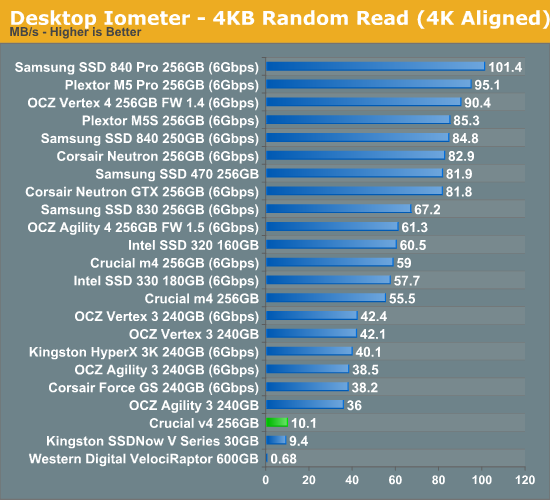
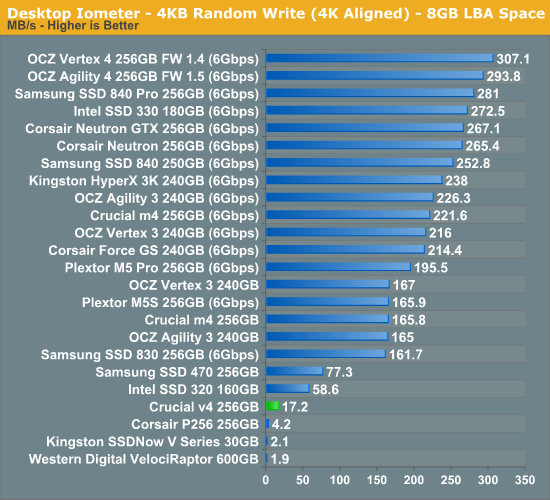
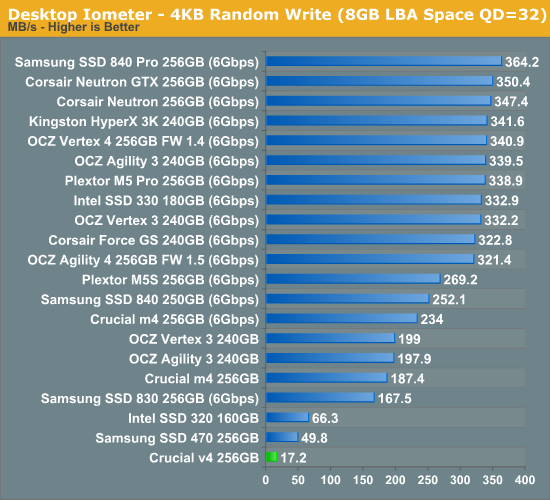
There isn't really a good way to put this: random performance is terrible. We have to go back at least two years to find SSDs this slow and even then we are talking about SSDs that were some of the worst ones that were available. I included a few older SSDs (e.g. Kingston SSDNow V Series and Corsair P256) to show that the v4 isn't the worst SSD on earth, but compared to other recent SSDs it's behind - by a lot. The only "good" news is just how poor even the 600GB VelociRaptor is by comparison; we're still an order of magnitude faster than one of the fastest hard drives for random IO.
Sequential Read/Write Speed
To measure sequential performance I ran a 1 minute long 128KB sequential test over the entire span of the drive at a queue depth of 1. The results reported are in average MB/s over the entire test length.
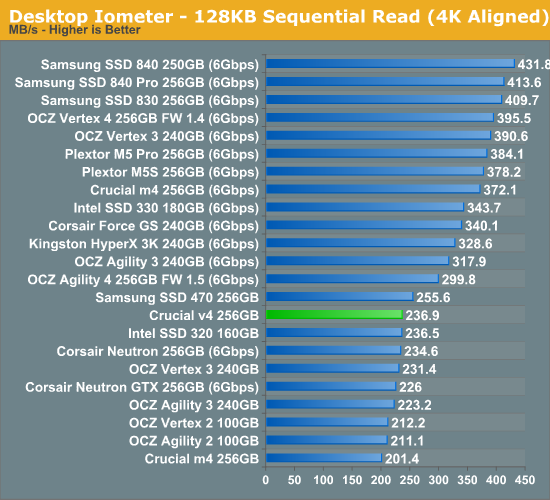
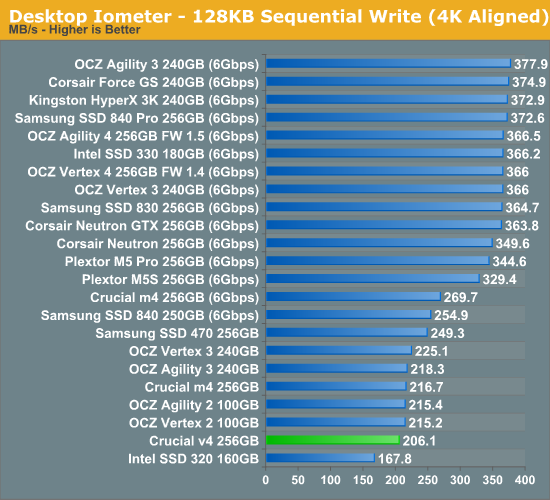
Sequential speeds are fortunately much better and we are talking about performance comparable to SATA 6Gbps operating at SATA 3Gbps speeds.










44 Comments
View All Comments
Lone Ranger - Friday, November 23, 2012 - link
On page two, you state that you are surprised to only find 8 packages on the board despite finding room for 16. In the next paragraph you state that the controller supports 8 channels. Is it possible to "gang" two packages together to one controller channel? If not, the controller is the reason that 16 packages aren't used.Kristian Vättö - Friday, November 23, 2012 - link
The controller supports up to 32 NAND packages (i.e. 4 per channel). Pretty much all consumer-grade controllers have eight channels but support more than one package per channelLone Ranger - Friday, November 23, 2012 - link
Thanks for the clarification.creed3020 - Friday, November 23, 2012 - link
I stopped reading at Phison PS3105...Most people who know SSDs understand their controllers are useless even in a low end product.
Pessimism - Friday, November 23, 2012 - link
Phison is the new JMicron.tjoynt - Saturday, November 24, 2012 - link
We spend so much time looking at the upper range of prrformance, it's nice to get a lower bound, too. :)It also demonstrates just how important a good controller is and how hard it is to make one. Also gives me a better idea of why usb flash drives and most devices with flash have so much lower performance than SSDs. Any one know what the cost differential is between a Psion and a Sandforce or Indilinx or Samsung?
infoilrator - Saturday, November 24, 2012 - link
The article implied about $10 more buys a better controller. I do not know where firmware vs hardware may make a difference.Crucual will sell these on the basis of its M4 reputation. Unfortunately I believe it will leave a large number of customers unset with crucial.
I do not want one at any price (hey, i found way better prices.
Would RAID0 help these any?
jack.fxx - Monday, November 26, 2012 - link
Well, even though benchmark results of V4 are considerably lower than other contemporary SSDs, it still is decent SSD. For example Windows boot time of V4 is the same as any other SSD (see http://www.legitreviews.com/article/2010/6/ ) , average user won't notice any difference between Samsung 840 Pro and V4.Benchmark results are pretty much useless when comparing desktop SSDs, because SSD drives in desktops/laptops are at least 99% of time idle, which means that 2x faster SSD will improve performace of your system at most by 0.5%.
crimson117 - Monday, November 26, 2012 - link
Casual users have gotten used to having 500GB, or 1TB of hard drive space, but few will use more than a small fraction of that capacity.A $99 128GB drive is perfect for most users and they don't realize what they're missing!
JonnyDough - Monday, November 26, 2012 - link
At its current price, the Crucial V4 is not a good deal. However, Crucial is one of the few PC component manufacturers based in the USA (they employ American's as well) so when it comes to purchases for SSDs and RAM I often go with them or Kingston.